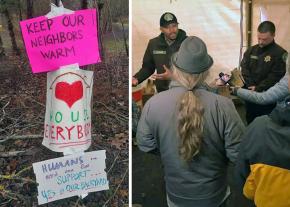Portland’s Village of Hope vows to rebuild
reports on the forced removal of a self-managed village of some of the most vulnerable people in Portland, Oregon.
IN A dawn raid on February 2, dozens of police and park rangers assaulted the Village of Hope, a self-managed houseless community on the outskirts of Portland, Oregon.
Only five days after building the village, residents were rousted from sleep and given 10 minutes to get out with a few possessions. Police used crime tape to keep out protesters and villagers, while a biohazard cleanup firm arrived to sweep away the tents, platforms, latrine, kitchen and community center structures.
Ironically, village residents had just days earlier brought dozens of garbage bags of trash out of a wooded area on Airport Way, a popular camping ground for the homeless.
Steve Kimes, a pastor with Anawim Christian Community Church, who is part of the on-site oversight committee, along with Ibrahim Mubarak of Right 2 Survive and Lisa Lake of Advocacy 5, emphasized that Village of Hope was "not pulling people and saying go ahead and move here."
"We're taking people who are already here and saying, 'Let's have a clean village,'" he said. "Let's have an organized one. Let's have a secure one. Let's protect the businesses. Let's protect the environment."

"We have a home," said Kerry Wheeler, a 50-year-old villager. "It may not have walls and a roof, it may be a tent, but it's what we've got. We didn't ask for it. We didn't get it from [the city]. The city's given us nothing but a headache, heartache and trouble."
When asked what she would do now that the encampment had been demolished, she replied, "I'm coming back."
VILLAGE OF Hope was just the latest in a series of self-managed houseless villages that have been established in Portland in recent years, all of them committed to safe, clean, stable living space. All the villages had to be built without city permission and at least three--Dignity Village, Right to Dream Too, and Hazelnut Grove--have survived through direct action and political struggle.
Despite a government-declared housing crisis in a city without enough shelter space and with thousands living on the street, Portland has stepped up harassment of homeless camps. A city-paid private contractor tricks the houseless into stepping away, then steals and trashes their possessions.
Houseless organizers wanted to push back with a bold and impressive project--of, by and for the homeless. In consultation with urban naturalists, the Village of Hope community developed a plan to maintain a low environmental impact. They put tents up on 10 separated platforms with cinderblocks and scattered bark dust on existing paths, determined to leave only a light footprint.
The mayor and parks commissioner immediately warned villagers their community would be removed.
In response to these threats, villagers reached out to faith, labor, tenants' rights, neighborhood and leftist groups to set up a picket line and an ongoing protest. In solidarity, activists raised signs and voices, both at City Hall and in front of the village. They took over a City Council meeting, demanding that the Village of Hope be left alone.
Just a day prior to the raid, dozens of picketers had discouraged park rangers from issuing citations, and the police had just cruised by the site.
Village of Hope has been in the works for a year and a half--ever since the Women's Village in the Lents neighborhood was forced off city land with the promise of another location. But the dispersed residents were never offered another spot.
After being swept out of downtown and other neighborhoods, a network of the houseless and service providers established this new encampment in an industrial area, out of sight and far from retail or residential areas.
In response, Mayor Ted Wheeler reprimanded those involved in the project. "This kind of unilateral action undercuts the efforts of government, nonprofits and the private sector partners who are aligned on a solution," said Wheeler. "The outright appropriation of environmentally sensitive public lands, intended for the use of everyone, is unacceptable."
Wheeler sheds crocodile tears about "environmentally sensitive public lands" being spoiled by human habitation--the area is actually zoned industrial and is right next to a warehouse--yet he raises no objection to his rich friends' mansions, which extend deep into Forest Park, the large urban forest on Portland's West Side.
Wheeler and previous mayors have allowed isolated camps in wooded areas, as long as they were out of sight and provoked no complaints from businesses or residents. And they have stood by and allowed "environmentally sensitive public lands" to accumulate trash.
When asked why he thought the mayor had moved so aggressively against the village, Mubarak said "he can't handle houseless people making their own decisions, running their own lives. Our villages cost the city nothing, and we transition people into jobs and housing. The city is a big poverty pimp. They would rather pay these police overtime to protect property and keep us in misery."
When asked if he would be back, Mubarak smiled and said, "And back, and back and back. As long as there are houseless people, we are in this fight."


